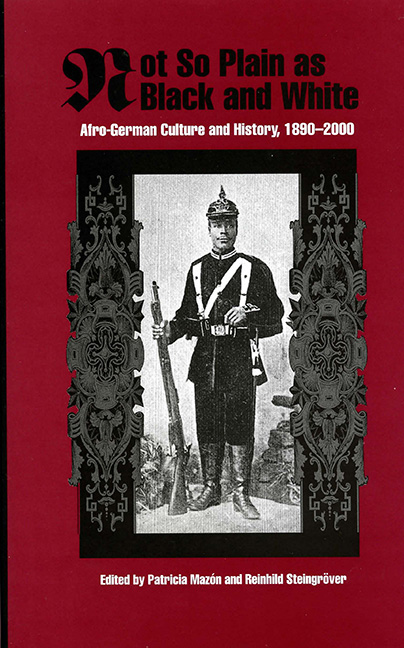Book contents
- Frontmatter
- Contents
- Foreword
- Introduction
- Part I Afro-Germans in Historical Perspective
- 1 Dangerous Liaisons: Race, Nation, and German Identity
- 2 The First Besatzungskinder: Afro-German Children, Colonial Childrearing Practices, and Racial Policy in German Southwest Africa, 1890–1914
- 3 Converging Specters of an Other Within: Race and Gender in Pre-1945 Afro-German History
- Part II Cultural Representations and Self-Representations of Afro-Germans
- Selected Bibliography
- Notes on Contributors
- Name Index
1 - Dangerous Liaisons: Race, Nation, and German Identity
from Part I - Afro-Germans in Historical Perspective
Published online by Cambridge University Press: 11 May 2017
- Frontmatter
- Contents
- Foreword
- Introduction
- Part I Afro-Germans in Historical Perspective
- 1 Dangerous Liaisons: Race, Nation, and German Identity
- 2 The First Besatzungskinder: Afro-German Children, Colonial Childrearing Practices, and Racial Policy in German Southwest Africa, 1890–1914
- 3 Converging Specters of an Other Within: Race and Gender in Pre-1945 Afro-German History
- Part II Cultural Representations and Self-Representations of Afro-Germans
- Selected Bibliography
- Notes on Contributors
- Name Index
Summary
Among the various rituals constructing and reinforcing group identity, sports are certainly central. Germany, as one could witness during the recent world championship in Japan and Korea, is a soccer-crazy nation. Soccer is the number-one national sport and accordingly a central source of pride and identification. Thus to learn about German notions of race and nation, it might be telling to look at the public response to the “first” black soccer player named to the prestigious national team in May 2001. The selection of Gerald Asamoah caused much comment in the press, and indeed race and nation figured prominently. Asamoah is a German national, but he was born in Ghana, of Ghanaian parents, who migrated to Germany when he was a child. This is an important piece of information in a nation that still deeply mistrusts the possibility of assimilation. While Ukrainian-born U.S. swimmer Lenny Krayzelburg, for example, was hailed as an American hero during the 2000 Olympics in Sydney, in Germany the possession of “German blood” is traditionally seen as a necessary prerequisite of proper national belonging. A sympathetic article in a liberal German newspaper praising Asamoah's selection as a signal against the soccer world's notorious racism, nevertheless managed to refer to him as “Ghanaian” five times and “African” three times, twice mentioning his “tribal origin.” Once he is described as a “holder of a German passport,” but never as “German.” In other articles as well, Asamoah is unambiguously identified as “black,” whereas his status as “German” (as opposed to “German passport holder”) seems doubtful. But he is not the only member of the national soccer team born outside of Germany. Miroslav Klose is an Aussiedler (an Eastern European “ethnic German” with an automatic right to German citizenship) and spent the first years of his life in Poland, while Oliver Neuville, a Swiss with a German father, did not speak a word of German when he joined the team. In contrast to the immense attention Asamoah's ethnicity attracted, these players’ non-German background is hardly ever mentioned. They do possess German blood, after all, and more important, as I will argue, they are white.
- Type
- Chapter
- Information
- Not So Plain as Black and WhiteAfro-German Culture and History, 1890–2000, pp. 27 - 60Publisher: Boydell & BrewerPrint publication year: 2005



